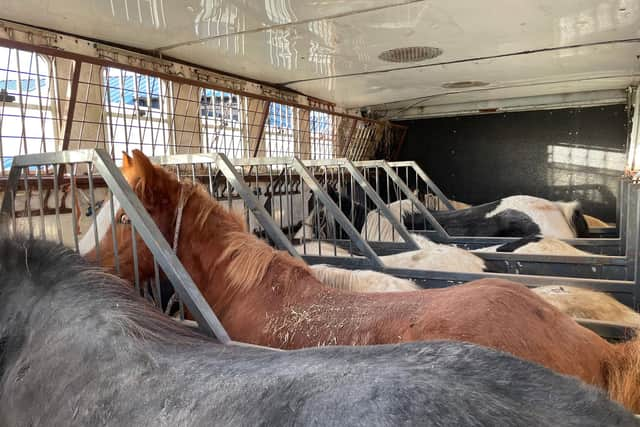Horses being smuggled out of Dover highlight ‘sickening threat to vulnerable animals’
and live on Freeview channel 276
The mixed load of 26 frightened and vulnerable animals had been crammed onto a transporter to be exported, possibly from Ireland, through Britain and on to Europe, but only 19 of them had the necessary paperwork for the journey and many had health issues making them unfit to travel.
At a time when the UK government’s Animal Welfare (Live Exports) Bill is progressing through the House of Lords, the case highlights the illegal trade in horses and why secondary legislation and robust enforcement and equine traceability are vital to protect British horses and ponies from an unknown fate.
Advertisement
Advertisement
World Horse Welfare chief executive Roly Owers explained: “We applaud the authorities for taking action in this case and stopping the vehicle, but far too often these lorries cross borders unchecked.


“From our initial investigations, the horses were allegedly travelling from the Republic of Ireland to France, using Britain as a land-bridge.
“But they are all British-born horses with some being bought from sales in England shortly before supposedly being ‘imported’ back into the country.
“Regardless of whether the horses started their journey in Ireland or Britain, it is highly likely that they would have been travelled for hours to potentially end their lives in a European slaughterhouse.
Advertisement
Advertisement
“Some are pregnant mares, others had health conditions making them unfit to travel, with one having to be euthanised because it was in such a poor state. Worryingly 13 of the horses are signed out of the food chain.”
Shortly after their arrival at World Horse Welfare’s Norfolk Rescue and Rehoming Centre, the group were found to be carrying Equine Influenza, a highly contagious disease affecting horses. Despite the Dover 26 being quarantined when they first arrived, the outbreak forced the farm to go into lockdown whilst the horses were treated to minimise the chances of further spread across the farm: a logistical and financial challenge for the charity.
Multiple infringements of transport regulations were also apparent – both when the horses were first discovered and subsequently when the horses were processed in Norfolk.
These included horses not healthy or fit enough for their intended journey, inappropriate space allowance for the number of horses being travelled, travelling unhandled horses, horses being travelled without passports, and excessive journey time.
Advertisement
Advertisement
At least five of the mares are pregnant, with a couple heavily pregnant where the risk to the mare and foal is high, and one of which is suffering badly from laminitis.
Sadly, an elderly mare with severe arthritis was in such a poor condition that she had to be put to sleep.
Amongst those rescued are a number of young, unhandled colts who were visibly terrified by their ordeal and smuggled on board as they were most likely surplus to a breeder’s requirements.
World Horse Welfare has long been campaigning for a ban on the live export of horses for slaughter from Britain, and whilst the forthcoming Animal Welfare (Live Exports) Bill is welcomed by the charity, the case of the Dover 26 demonstrates the need for secondary legislation that will introduce measures to help ensure the ban can be enforced.
Advertisement
Advertisement
“This case highlights the tragic reality we believe countless equines have to suffer through being exported to slaughter,” explained Owers.
“Drivers and vehicles are switched, horses pass through multiple hands, sometimes on fraudulent passports, and are moved between local authority areas and from country to country, before they are exported.
“All to make it harder to trace the people involved, the individual equines being moved and the long journeys that they are being subjected to.
“To put an end to these abhorrent movements and to protect our nation’s horses, it is imperative that the UK government gets the Live Export Bill onto the statute book, finally implements a robust and digitalised equine identification system, and establishes an effective system for enforcing all equine legislation, so that smugglers can no longer hide behind a smokescreen of confusion.”